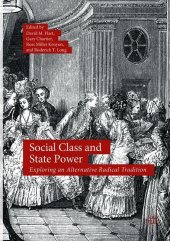 Neuerscheinungen 2019Stand: 2020-02-01 |
Schnellsuche
ISBN/Stichwort/Autor
|
Herderstraße 10
10625 Berlin
Tel.: 030 315 714 16
Fax 030 315 714 14
info@buchspektrum.de |

Gary Chartier, David M. Hart, Ross Miller Kenyon, Roderick T. Long
(Beteiligte)
Social Class and State Power
Exploring an Alternative Radical Tradition
Herausgegeben von Hart, David M.; Chartier, Gary; Kenyon, Ross Miller; Long, Roderick T.
Softcover reprint of the original 1st ed. 2018. 2019. xxvi, 345 S. 210 mm
Verlag/Jahr: SPRINGER, BERLIN; SPRINGER INTERNATIONAL PUBLISHING 2019
ISBN: 3-319-87896-4 (3319878964)
Neue ISBN: 978-3-319-87896-6 (9783319878966)
Preis und Lieferzeit: Bitte klicken
This book explores the idea of social class in the liberal tradition. It collects classical and contemporary texts illustrating and examining the liberal origins of class analysis-often associated with Marxism but actually rooted in the work of liberal theorists. Liberal class analysis emphasizes the constitutive connection between state power and class position. Social Class and State Power documents the rich tradition of liberal class theory, its rediscovery in the twentieth century, and the possibilities it opens up for research in the new millenium.
Classic Works of Classical Liberal Class Analysis
1 Richard Overton, "Monopolists as Frogs and Vermin" (1641)
2 Adam Smith, "On Conspiracies, Monopolies, and Unproductive Labour" (1776)
3 Thomas Paine, "On Governments, Placemen, and Pensioners" (1792)
4 William Godwin, "Of Courts, Subjects, and Pensions" (1793)
5 Jeremy Bentham, "On Mischiefs and the Sinister Interests" (1817, 1824)
6 Thomas Hodgskin, "On Obedience as the Object of Legislation" (1832) .
7 William Leggett , "The Lordlings of the Paper Dynasty" (1834)
8 James Mill, "On Those Who Pillage and Those Who Are Pillaged" (1835)
9 John Wade, "The Aristoc
racy and the Oligarchy" (1835)
10 Adolphe Blanqui,"The Class Which Does Not Kill or Pillage" (1837)
11 Richard Cobden, "England is a perfect Paradise for the Aristocracy" (1845-49)
12 Frédéric Bastiat, "On the English Oligarchy and Legal Plunder" (1845, 1847)
13 John C. Calhoun, "Tax Payers versus Tax Receivers" (1849)
14 Charles Renouard, "Robbers as Parasites" (1852)
15 Gustave de Molinari, "The Nobility as Conquering Plunderers" (1852)
16 Augustin Thierry, "The Emancipation of the Bourgeoisie" (1853)
17 Herbert Spencer, "On Class Bias and the Militant Type of Societ
y" (1873, 1882)
18 Lysander Spooner, "On Government as a Band of Robbers and Murderers" (1870, 1882)
19 William Graham Sumner, "On Forgotten Men and Plutocrats" (1883)
20 Benjamin R. Tucker, "The Four Monopolies: Money, Land, Tariffs, and Patents" (1888)
21 Vifredo Pareto, "The Decline and Rise of Elites" (1900)
22 Franz Oppenheimer, "The Economic versus the Political Means of Acquiring Wealth" (1908)
23 Albert J. Nock, Our Enemy, the State (1935)
24 Ludwig von Mises, "On Castes, Classes, and Group Interests" (1945)
Contemporary Interpretations of Classical Liberal Class Analysis
25 Murray N. Rothbard, "The Anatomy of the State" (1965)
26 Roy A. Childs, "Big Business and the Rise of American Statism" (1969, 1971)
27 Walter E. Grinder and John Hagel, "Toward a Theory of State Capitalism:
Ultimate Decision-Making and Class Structure" (1974)
28 Hans-Hermann Hoppe, "Marxist and Austrian Class Analysis" (1990)
29 Roderick T. Long, "Toward a Libertarian Theory of Class" (1998)
David M. Hart, Director, Online Library of Liberty, Liberty Fund, Indianapolis, USA
Gary Chartier, Distinguished Professor of Law and Business Ethics, La Sierra University, USA
Ross Miller Kenyon, independent scholar and video producer, Los Angeles, USA


